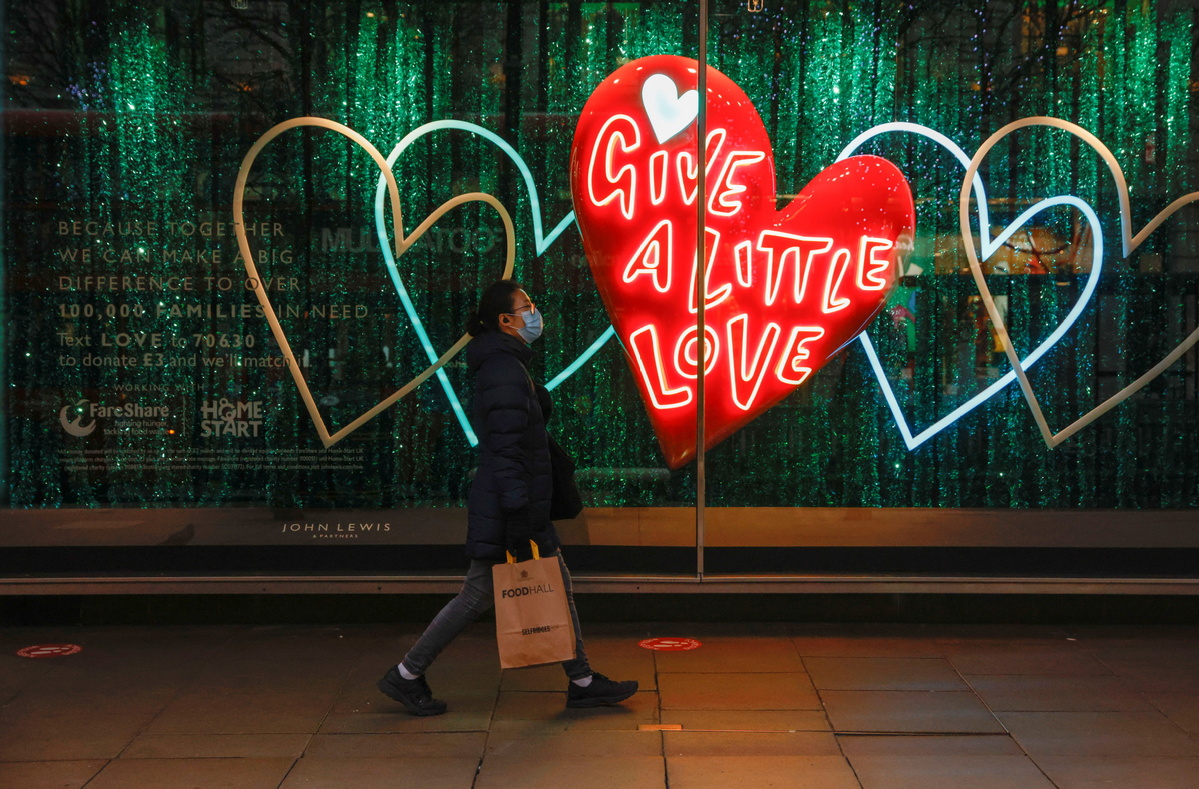High street under siege as COVID-19 hastens shift online
By BO LEUNG in London | CHINA DAILY | Updated: 2021-01-12 09:45

The year 2020 was tough for the retail industry in the United Kingdom. The novel coronavirus hammered the sector as scores of shops closed. Some went out of business because of the lockdowns and restrictions.
Just five days before Christmas, the government announced tier 4 restrictions for London, southeast and east England, delivering another hammer blow to retailers who were expecting a rush in business in the week before Christmas.
It got worse because when 2021 rolled in after a third national lockdown was announced.
Retail has been one of the biggest economic casualties in the pandemic as nonessential retailers were forced to shut during the national lockdowns in a bid to slow the spread of the virus.
The collapse of Arcadia and Debenhams added to the difficult year.
But while COVID-19 dealt the industry a bitter blow, the British high street was already struggling as it competes with the explosive growth of e-commerce.
"The collapse of the high street, or rather the weaker performers within it, is a trend that was exacerbated by COVID-19, but was apparent beforehand," said Michael Waterson, a professor in the department of economics at the University of Warwick.
It's thought that consumers were no longer connecting to the high street stores, boutique retailers, coffee shops, and small independent shops.
"Retailers are partly to blame themselves for the general trend. Locations have become homogenized, so visiting one large town is like visiting any other. Selling has become deskilled, so that sales people cannot be relied upon to give advice in most stores. In many locations, retailers are open primarily during the normal working day when consumers will be at work," Waterson said.
The Warwick University professor added: "This is more apparent in Britain than in many other European countries, where shop hours are more extended and there is more social interaction involved in purchase."
For Debenhams and Arcadia, along with other big names going into administration, experts said these brands struggled during the pandemic because they had not invested or innovated sufficiently in recent years.
"Simply, many of these were already in steep decline, had too much legacy and debt to deal with. Their huge aging and costly retail estates had not kept pace with the times. Investment in product development, marketing, store experience and e-commerce wounding them hard at the time it mattered most," said Karl McKeever, a retail analyst and director of retail agency Visual Thinking.
As more people turn to online shopping, experts pointed out that the high street has become unsustainable as many did not strengthen their online presence at a fast enough pace.
Viable alternative
"For significant parts of 2020, all 'nonessential' retailers have been closed in large parts of the country, particularly city centers. Hence, whilst consumption of many goods has declined, use of the internet as a purchase medium has grown since at no time during the year were internet sales unavailable," Waterson said.
McKeever said British shoppers will continue to shop online well beyond the pandemic.
"Fundamentally, e-commerce has filled a gap and fulfilled our needs. When we couldn't visit the shops, this was now a viable, trusted alternative. And whilst we've been confined to our homes-the solution for many everyday purchases and for people with more time on their hands. But It should not be assumed that only brands with online shops will continue to prosper, as Primark regularly demonstrate," McKeever said.
In 2010, internet purchases amounted to 6.6 percent of all purchases with food at 2.5 percent and nonfood at 5.5 percent.
By the start of 2020, almost 20 percent of all purchases were online; only 5.4 percent of food but almost 15 percent of nonfood, the Office of National Statistics said.
McKeever said those retailers that have managed to stay afloat developed strong brands and stores had built on that success.
"From a strong retail platform, many have built new online digital services to 'join up' their e-commerce and physical stores businesses. Brands such as Dixons Carphone, John Lewis, Next, have all found ways to combine the knowledge, expertise and services of their in-store colleagues to support shoppers via new video shopping services to provide advice, expertise and continuity of 'staff service' but via online channels/video conferencing platforms, etc," he said.
McKeever added this has been crucial in providing a connection for expertise, information and advice to give shoppers reassurance of what to buy.
He added that the high street and retail sector must catch up with the pace of change in order to survive and British retailers will need to keep innovating and investing in their stores.
"In-store retailers will have to focus on their in-store propositions, what makes them different, special, connected and cohesive as a brand and how they can specialize and add distinctiveness," McKeever said.
"Certainly, shoppers will be less forgiving of poor standards, sloppy service and a mediocre environment with poor visual merchandising. They will need good reasons to tempt them away from the sofa and shopping online. That's where the best retailers will focus on adding surprise, delight and satisfaction-the more emotionally based payoff that is so often lacking with online shopping," McKeever added.
























